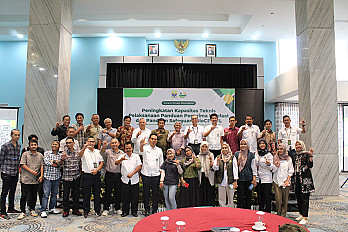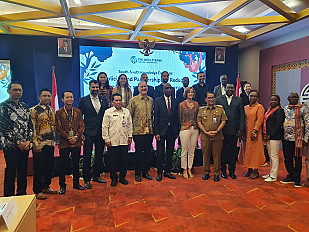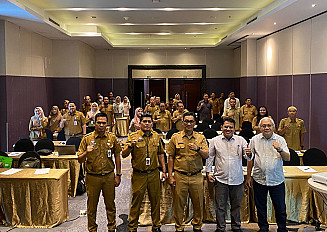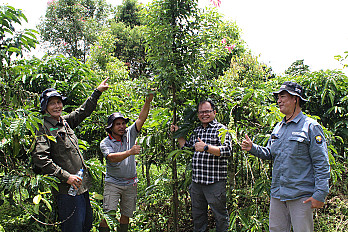
Increased Technical Capacity for the Implementation of the Beneficiary Identification Guide and BioCF ISFL E&S Safeguard Guide

BALIKPAPAN - Head of the Jambi Province Development Planning Agency, Ir. Agus Sunaryo, M.Si and accompanied by the Head of the Economy and Natural Resources Division of the Jambi Province Bappeda, Dr. Ahmad Subhan, S.IP, M.Si and Sub-National Chair of PMU BioCF-ISFL Jambi, ir. H. Sepdiinal, ME attended the South - South Knowledge Exchange meeting, participated in discussion forums from 3 countries such as Indonesia, Brazil and the Democratic Republic of Congo, where this activity was facilitated by the World Bank, which took place at the Platinum Hotel, Monday 27 May 2024.
South - South Knowledge Exchange itself is a knowledge exchange activity by developing countries or could also be countries in the global south. In the presentation, the Sub-National Chair of PMU BioCF-ISFL Jambi, provided an explanation regarding reducing carbon emissions from deforestation and forest degradation in Jambi Province through BioCarbon Fund - Initiative for Sustainable Forest Landscape activities.

Meeting to discuss the results of calculating the accuracy value of land cover change data for Jambi Province
Held by Team MAR BioCF-ISFL Jambi on 6 to 8 May 2024
-thumb.jpg )
Tuesday, March 26 2024, an FGD was held to discuss the latest regional regulations on CSR/TJSLBU programs that support the development of Jambi Province and reduce emissions.
Regulation of the Minister of Social Affairs of the Republic of Indonesia Number 9 of 2020 concerning Social and Environmental Responsibility of Business Entities regulates the implementation of social and environmental responsibility obligations of business entities as a form of participation of Business Entities in sustainable social development
Social and Environmental Responsibility itself is a business entity's commitment to participate in sustainable social development in order to improve the quality of life and a beneficial environment, both for the business entity itself, the local community and society in general.
A business entity is an organizational unit that aims to make a profit and provide services to the community.
The Business Entity Social and Environmental Responsibility Forum, hereinafter referred to as the "Forum", is an institution that aims to optimize the commitment and role of Business Entities through the implementation of their social and environmental responsibilities.
Social and Environmental Responsibility of Business Entities (TJSLBU) is intended as a form of participation of Business Entities in sustainable social development and aims to:
1. Social problems are handled and those in need of Social Welfare Services are served;
2. Increasing the image and profits as well as maintaining the survival of the Business Entity.
-thumb.jpg )
In order to monitor and evaluate the implementation of the Jambi Sustainable Landscape Management Project (JSLMP) BioCF-ISFL Program activities in Jambi Province in 2024 and follow up on the results of the FGD on the Monitoring and Evaluation Plan (Monev Plan) for the 2024 Annual Work Plan, an FGD was carried out on Refining the Draft Monev Plan Document 2024 on Tuesday, March 26 2024.
Explained by Mas Rezky Syahrizal Yusuf as Monev Specialist Steps for Preparing Monitoring and Evaluation Plan Documents (Monev Plan)
1. Determine the objectives/scope of Monev
2. Understand the definitions and targets of indicators/outputs. Information is provided in the PAD
3. Build a strong (comprehensive) definition of the output
4. Collection of secondary and primary data (methods and tools)
5. Data analysis and reporting

REDD+ (Reduction of Emissions From Deforestation and Defradation) is a reduction in emissions from deforestation and forest degradation. Defirestation is a permanent change in land cover from forest to non-forest. The difference with forest degradation lies in the quantity and quality of forests, for example the quality of carbon stocks from previously 1 ton CO2 to 0.5 tons CO2 Plus (+) from REDD+, namely protection and conservation of carbon stocks in forests, sustainable forest management, and increasing carbon stocks. If REDD+ is successful, you will get a positive incentive called Result Based Payment, but the condition is that you have ensured environmental and social safeguards and have also created a national/regional strategy or action plan.
National has created a REDD+ strategy, one of which is the REDD+ Framework which contains 4 components, namely:
1. Implementation, carried out in forest cover and can be implemented nationally, government/private sector or community
2. REDD+ architecture, needs to create a national strategy and safeguards, forest monitoring and needs funding support from the APBN
3. Create an Information System to contain Safeguard
4. MOI as a means and infrastructure for implementing REDD+ requires technology, funding, increasing human resource capacity, and institutional support, rules, regulations and systems.
Points that are no less important are Non-Carbon Benefits in the form of conservation, protection of hydrological functions, protection of ecological functions, increasing community welfare, improving forest governance and protecting essential ecosystems (Geoparks).
Currently the BioCF Program is in the 4th year of Pre-Investment stage, and it is hoped that in 2025-2026 it will enter the RBP phase. In the RBP phase, all regencies/cities except Jambi City will be involved in this RBP scheme, so it is important for regencies/cities to understand the RBP so they can prepare everything.

Received Assistance to Increase Farmers' Capacity in the form of Technical Guidance for Organic Fertilizer Processing and APPO Machines (Organic Fertilizer Cutter Tools)
This farmer group has a sheep farm which produces manure as material for organic fertilizer. After receiving capacity building through PIU DTPHP regarding procedures for making good organic fertilizer using APPO machines, this farmer group is able to produce organic fertilizer that can be used for its own agricultural land so that it does not requires more chemical fertilizers and the vegetables become organic products.
Apart from that, the organic fertilizer produced by this farmer group is also sold to other farmers around Sei Lalang Village for IDR 60,000 / sack, thereby increasing the financial income of the Sumber Makmur farmer group.
—-
By reducing the use of chemical fertilizers, it is hoped that the carbon footprint on agricultural land can be reduced.
Sustainable agriculture is the implementation of the concept of sustainable development in the agricultural sector. The concept of sustainable agriculture relies on three pillars, namely economic, social and ecological.
https://www.instagram.com/reel/C4Pm4UdyyP3/?igsh=MXdwYTgybzdkaWRiNg==

Activities: Developing community model business development for alternative livelihoods, sub-activity planting, Forest and Land Rehabilitation in Muara Madras Village, the 50 Ha planting location is in the Bukit Muncung Gamut Protected Forest area. This activity has a positive impact on repairing, enhancing and maintaining the condition of the land so that it can function optimally, both as an element of production, supporting the community's economy and as a medium for regulating water management as well as an element of nature and environmental protection.
The number of seeds given to the community was 77,000 seeds with the types of seeds namely Cinnamon seeds, Petai seeds, Surian seeds, Bambang Lanang seeds, Durian seeds and Avocado seeds. Planting was carried out by 42 members of the farmer group, the distribution of seeds was adjusted to the size of the planting location.
The average percentage of living plants at each planting location is around ±70% and ±30% dead, namely Bambang Lanang seeds and Surian seeds. This is due to inappropriate planting time. Planting was carried out during El Nino, which triggered a decline in plant quality, the spread of pests and plant diseases.
Plant maintenance, including fertilizing plants using organic compost and replanting, thinning and weeding, will be carried out in the first semester of 2024.
Apart from that, access to the planting location is quite difficult, with only two-wheeled vehicles and dirt roads resulting in death and damage to the seeds during the transportation process to the planting location.

Activities for Determining Prospective Farmers and Prospective Locations for Recipients of Cinnamon Seeds Ready for Planting in Merangin Regency Spice and Plantation Commodity Freshener (BioCF) Activities for the Jambi Provincial Plantation Service in Rantau Kermas Village, total planting location of 44 Ha. The number of seeds given to the community was 22,000 seeds with the type of seed, namely Cinnamon seeds ready for planting. Planting was carried out by 25 members of the farmer group, the distribution of seeds was adjusted to the size of the planting location. Planting was also carried out according to the initial plan, namely planted between coffee plants, within a period of approximately one and a half years, the Cinnamon seedlings had grown to a height of approximately two meters.

In the framework of the Full Implementation of the BioCF-ISFL MAR System in 2024 regarding the reporting of Emission Reduction (ER) calculations and following up on the analysis meeting for calculating accuracy values and identifying land cover change data in Jambi Province from 23 to 24 February 2024, a follow-up meeting was held for the MAR Division to complete the calculations value of accuracy and completion of land cover change data preparation in Jambi Province.